Microsoft Fabric Consulting
- Microsoft Fabric: It offers a comprehensive and streamlined solution that caters to diverse analytics workloads and users, all built upon a robust data foundation designed for enterprise-grade performance.
- Software-as-a-Service: Microsoft Fabric seamlessly combines Power BI, Data Factory, and the cutting-edge iteration of Synapse, presenting a unified software-as-a-service (SaaS) solution. This innovative offering empowers customers with a cost-efficient and effortlessly administered modern analytics platform, specifically tailored to meet the demands of the AI-driven era.
- All-in-one solution: Fabric encompasses a comprehensive suite of capabilities designed to cater to diverse workloads and empower data professionals across various domains. This all-in-one solution seamlessly integrates data integration, data engineering, data warehousing, data science, real-time analytics, applied observability, and business intelligence functionalities, resulting in unparalleled productivity enhancements.
- Microsoft and Cazton: We work closely with Data Platform, OpenAI, Azure OpenAI and many other Microsoft teams. Thanks to Microsoft for providing us with very early access to critical technologies.
- Top clients: At Cazton, we help Fortune 500, large, mid-size and startup companies with Cloud, Big Data and AI development, deployment (MLOps), consulting, recruiting services and hands-on training services. Our clients include Microsoft, Broadcom, Thomson Reuters, Bank of America, Macquarie, Dell and more.
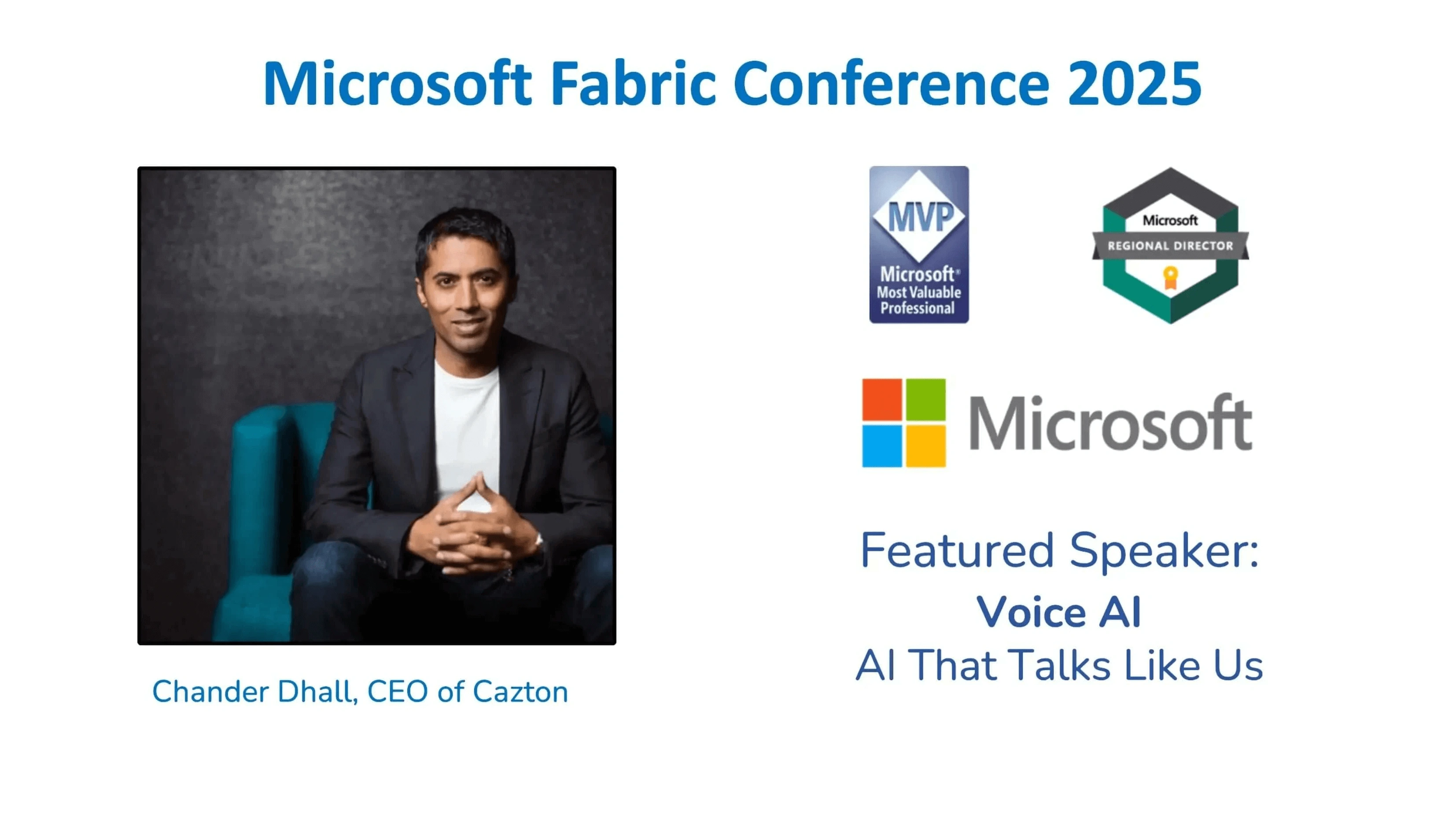
Cazton CEO Chander Dhall presented "AI That Talks Like Us: Fabric Makes Chatting with Data Effortless" at Microsoft Fabric Conf 2025, where he demonstrated how Microsoft Fabric, Azure OpenAI, and Azure Cosmos DB work together to create human-like conversational AI that interacts with data in real-time. His session showcased advanced voice-based Retrieval-Augmented Generation (RAG) technology with multilingual capabilities in Japanese, Mandarin, Hindi, French, and Arabic, along with practical implementations using DiskANN, full text search, and hybrid search techniques. The presentation highlighted cutting-edge approaches to making complex data accessible through natural, conversational interactions that break language barriers.
Microsoft Fabric: A Unified Data Analytics Platform for the Modern Enterprise
In the modern era of data-driven business, organizations face the critical task of effectively managing and extracting meaningful insights from massive volumes of data. To address this challenge, Microsoft Fabric offers an advanced data analytics platform equipped with powerful capabilities that empower businesses to unlock the full potential of their data assets. In this article, we will explore the key features of Microsoft Fabric. We will discuss how Microsoft Fabric revolutionizes data-driven decision-making processes by supporting artificial intelligence (AI) and machine learning (ML) applications.
Microsoft Fabric serves as a comprehensive and all-encompassing data analytics platform. It provides a suite of robust tools and services specifically designed to efficiently process, analyze, and visualize large-scale datasets. Its versatility enables seamless integration with diverse data sources, empowering businesses to extract valuable insights from their data. It offers a comprehensive and streamlined solution that caters to diverse analytics workloads and users, all built upon a robust data foundation designed for enterprise-grade performance.
It brings together Power BI, Data Factory, and the cutting-edge iteration of Synapse, presenting a unified software-as-a-service (SaaS) solution. This innovative offering empowers customers with a cost-efficient and effortlessly administered modern analytics platform, specifically tailored to meet the demands of the AI-driven era. It encompasses a comprehensive suite of capabilities designed to cater to diverse workloads and empower data professionals across various domains. This all-in-one solution seamlessly integrates data integration, data engineering, data warehousing, data science, real-time analytics, applied observability, and business intelligence functionalities, resulting in unparalleled productivity enhancements. By consolidating these crucial elements within a unified platform, Fabric enables users to unlock unprecedented efficiency and streamline their workflows to unprecedented levels.
The platform's user-friendly interface eliminates the need for coding, making it accessible to a wider audience. With Microsoft Fabric, businesses gain a holistic view of their data, consolidating information from various sources into a single, unified perspective. This consolidation facilitates swift and effortless data analysis, enabling organizations to derive insights that drive smarter decision-making.
Key Features of Microsoft Fabric
-
Comprehensive analytics solution: Microsoft Fabric revolutionizes the analytics landscape by offering a unified solution that addresses the challenges of integrating multiple subsystems and products from various vendors. Gone are the complexities, fragilities, and exorbitant costs associated with such endeavors. With Fabric, users gain access to a single, all-encompassing product that provides a unified experience and architecture, catering to the diverse capabilities required for extracting valuable insights from data and presenting them to business users.
As a software-as-a-service (SaaS) offering, Fabric seamlessly automates integration and optimization, enabling users to sign up effortlessly and derive tangible business value within minutes. This empowers every team involved in the analytics process, including data engineers, data warehousing professionals, data scientists, data analysts, and business users, providing them with role-specific experiences that foster familiarity, productivity, and collaboration.
-
Open and Lake-centric: In the realm of data management, the complexity and disorderliness of data lakes present formidable challenges, making it arduous for customers to create, integrate, manage, and operate them. Moreover, the coexistence of diverse data products with disparate formats within a single data lake can result in excessive data duplication and concerns about vendor lock-in. To address these issues, Microsoft Fabric introduces OneLake, a software-as-a-service (SaaS), multi-cloud data lake seamlessly integrated within the Fabric ecosystem.
OneLake serves as the data equivalent of OneDrive, automatically available to all Fabric users and simplifying data organization, indexing, discovery, sharing, governance, and compliance. By centralizing data storage and eliminating isolated storage accounts, OneLake eliminates messy data silos and provides developers, business analysts, and business users with a unified storage system. OneLake is built on Azure Data Lake Storage Gen2 (ADLSg2) and supports compatibility across multiple clouds, facilitating easy composition and analysis of data. Notably, OneLake's "Shortcuts" feature allows efficient data sharing without unnecessary duplication by virtualizing data lake storage across ADLSg2, Amazon Simple Storage Service (Amazon S3), and soon, Google Storage.
-
Uses open format: Fabric upholds a robust commitment to open data formats across its comprehensive range of workloads and tiers. By designating Delta on top of Parquet files as the default native format for all operations, Fabric enables customers to streamline their data management processes. With this approach, data only needs to be loaded into the data lake once, eliminating the requirement for separate ingestion across various workloads.
OneLake, the chosen data store, offers extensive support for both structured and unstructured data, granting customers unparalleled flexibility. By embracing OneLake as the centralized store and adopting Delta and Parquet formats, Fabric establishes a unified data stack that eliminates the need for maintaining multiple data copies across diverse systems. This integrated approach empowers all workloads to draw from a single data source efficiently. Additionally, Fabric recognizes the challenges associated with data security management and plans to introduce a forthcoming universal security model, meticulously managed within OneLake. This model ensures consistent and comprehensive enforcement across all engines, reinforcing data protection measures for enhanced security and peace of mind.
-
AI-powered: Fabric is integrating the Azure OpenAI Service across every layer of its infrastructure, enabling customers to unleash the full potential of their data. This integration empowers developers to leverage the power of generative AI for data analysis, while assisting business users in uncovering valuable insights. With Copilot integrated into Microsoft Fabric's data experiences, users can seamlessly create dataflows, build pipelines, generate code and functions, develop machine learning models, and visualize results using conversational language.
Furthermore, customers have the flexibility to create their own conversational language experiences by combining Azure OpenAI Service models with their data and publishing them as plug-ins. Upholding its commitment to enterprise data security and privacy, Copilot in Microsoft Fabric respects organizations' security, compliance, and privacy policies, and does not utilize tenant data for training the language models. The availability of Copilot in Microsoft Fabric will be announced soon, further enriching the platform with advanced capabilities.
-
Real-Time Processing: Data Activator is an upcoming feature in Microsoft Fabric that empowers business users with real-time data detection and monitoring capabilities. With Data Activator, users can define specific patterns or conditions to search for in their data, enabling them to stay informed about critical events or changes as they happen. It is designed to operate on various types of data, spanning from data residing in warehouses with relatively slow movement to real-time streaming data. This powerful capability allows Data Activator to handle diverse data sources and provide real-time detection and monitoring capabilities across the entire data ecosystem.
This no-code solution allows users to set up custom rules and triggers, such as anomaly detection or monitoring data quality metrics, and receive notifications or trigger automated actions when these patterns are detected. By providing agile and responsive data monitoring, Data Activator enables business users to proactively identify opportunities and make timely decisions based on real-time insights, without the need for extensive technical expertise or reliance on data engineering teams.
-
Empowers business users: Fabric integrates seamlessly with Microsoft 365 applications to empower customers in cultivating a data-driven culture where informed decision-making is ingrained at every level. Power BI, deeply embedded within Fabric, is tightly integrated with popular applications like Excel, Microsoft Teams, PowerPoint, and SharePoint. This integration enables users to effortlessly discover and access relevant data from OneLake directly within Microsoft 365, maximizing the value derived from their data assets.
With Fabric, Microsoft 365 apps become hubs for uncovering insights, allowing users to analyze data in Excel, infuse data into their work in Teams, embed live Power BI reports in PowerPoint presentations, and seamlessly share insights through SharePoint integration. Additionally, the preview feature of Microsoft Graph Data Connect enables the native integration of Microsoft 365 data into OneLake, unlocking valuable insights across customer relationships, business processes, security and compliance, and workforce productivity.
-
Data visualization: Microsoft Fabric revolutionizes data visualization by offering users powerful capabilities to create interactive and insightful visual representations of their data. Through seamless integration with Power BI, Fabric enables easy connectivity to data sources, both within OneLake and external systems, and provides comprehensive tools for data ingestion, transformation, and modeling. With a diverse range of visualization options, including charts, graphs, maps, and more, users can customize and tailor their visualizations to effectively communicate data patterns and trends.
Interactive features such as drill-down, filtering, and slicing enhance data exploration, while real-time data streaming and integration enable the creation of live dashboards and visualizations for timely insights. Fabric's integration with Microsoft 365 applications allows for the seamless embedding of live Power BI reports within familiar tools like Excel, PowerPoint, and Teams, facilitating collaboration and widespread access to data-driven insights. In summary, Microsoft Fabric empowers users with a comprehensive suite of data visualization capabilities, empowering them to derive actionable insights and facilitate informed decision-making throughout the organization.
-
Cost effective: In today's analytics landscape, organizations often rely on a combination of products from different vendors, resulting in fragmented computing capacity across various systems. This leads to underutilization of resources and significant wastage, as idle capacity in one system cannot be efficiently utilized by others. However, with Fabric, the process of purchasing and managing computing resources is greatly simplified.
By offering a unified pool of computing capacity, Fabric enables customers to leverage all workloads seamlessly, eliminating friction and optimizing resource utilization. This comprehensive approach not only enhances the user experience but also significantly reduces costs by allowing unused compute capacity to be dynamically allocated across workloads, minimizing waste and maximizing efficiency.
Core workloads of Microsoft Fabric
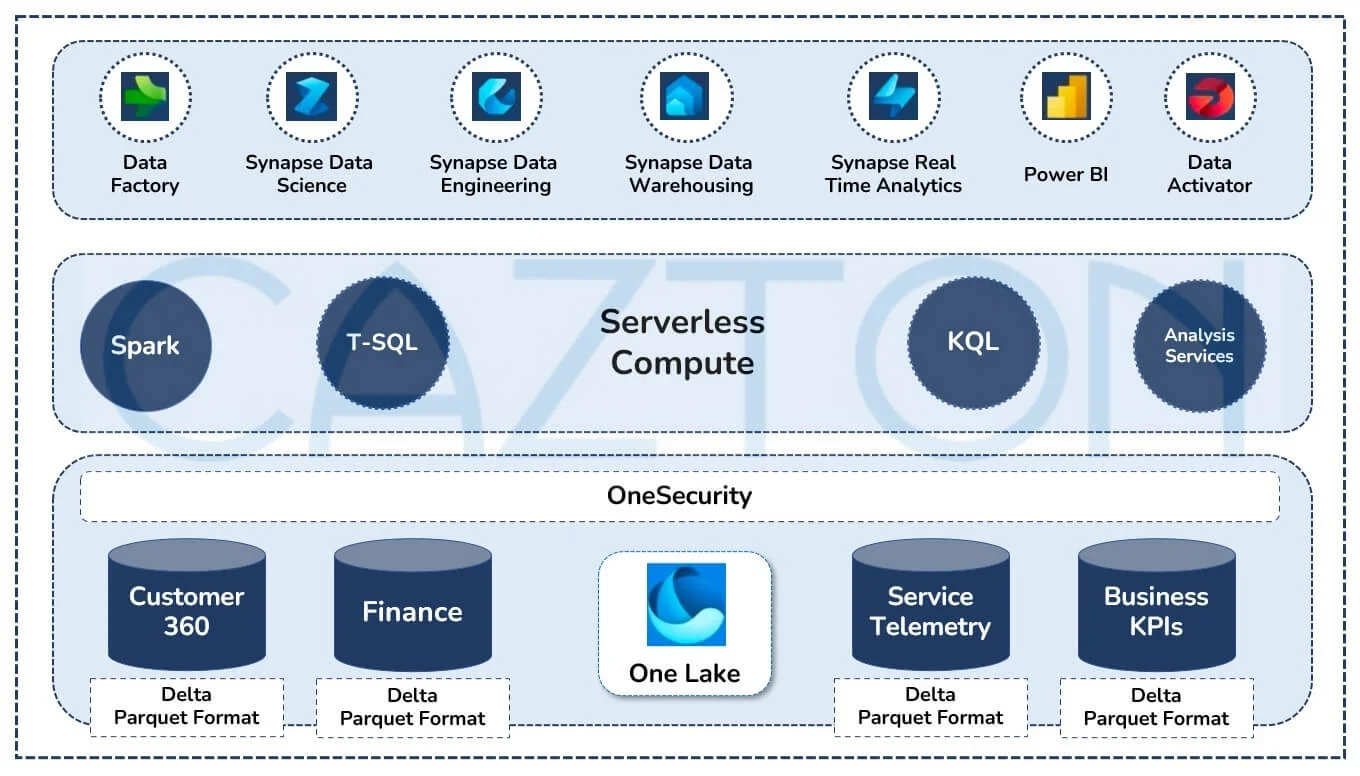
-
Data Factory: It is a robust and versatile data integration service that simplifies the movement and transformation of data across various cloud and on-premises sources. With over 150 connectors available, Data Factory ensures seamless connectivity to popular data sources, enabling users to extract data regardless of its location or format. Its intuitive drag-and-drop interface empowers users to effortlessly design data transformation workflows, eliminating the need for complex coding. Additionally, Data Factory offers robust data pipeline orchestration capabilities, allowing users to define dependencies, schedules, and data flow sequences.
Monitoring and management functionalities provide visibility into pipeline progress, data lineage, and performance metrics. Data Factory seamlessly integrates with other Azure services, offering enhanced data governance, security, and advanced analytics capabilities. The service's scalability supports large-scale data processing, parallel execution, and serverless data movement, catering to both small-scale integration tasks and enterprise-level data challenges. In summary, Data Factory empowers organizations to efficiently integrate, transform, and orchestrate data, laying the foundation for advanced analytics and informed decision-making.
-
Synapse Data Engineering: In the context of Microsoft Fabric, a lakehouse refers to a collection of files, folders, and tables that represent a database over a data lake, used for big data processing by the Apache Spark engine and SQL engine. The lakehouse includes advanced features for ACID transactions, particularly when utilizing the open-source Delta formatted tables. Within Microsoft OneLake, the lakehouse is hosted in a dedicated workspace folder and comprises files in various formats, organized in folders and subfolders. Fabric also offers a versatile notebook tool, which allows users to interactively program in multiple languages, run Spark jobs, visualize results, and collaborate with team members.
This notebook tool serves as a valuable resource for data engineers and data scientists to explore and process data, as well as build machine learning experiments using a combination of code and low-code capabilities. Furthermore, Fabric supports Spark applications, which are user-written programs that execute parallel Spark jobs for faster data processing. These jobs are defined by a set of parameters provided by the user, dictating how the Spark application should be executed. Additionally, Fabric employs a write optimization technique called v-order, which enhances the Parquet file format to enable quick reads, cost efficiency, and improved performance. By default, all Fabric engines write v-ordered Parquet files.
- Synapse Data Warehousing: In the context of Microsoft Fabric, each Lakehouse incorporates a SQL Endpoint, which provides users with the ability to query data stored in delta tables using T-SQL over TDS (Tabular Data Stream). This SQL Endpoint enhances the querying capabilities and enables seamless interaction with the data within the Lakehouse. Additionally, Fabric includes the Synapse Data Warehouse functionality, which represents a traditional data warehouse solution that supports comprehensive transactional T-SQL capabilities, catering to the requirements of enterprise data warehousing. With Synapse Data Warehouse, users can leverage familiar T-SQL queries to process and analyze their data effectively.
-
Synapse Data Science: Within the Microsoft Fabric ecosystem, the Data Wrangler tool offers users an immersive notebook-based experience for conducting exploratory data analysis. This feature integrates a grid-like data display with dynamic summary statistics and a range of commonly used data cleansing operations, all accessible through user-friendly icons. Each operation generates code snippets that can be saved as reusable scripts within the notebook.
Additionally, Fabric provides the concept of a machine learning experiment, which serves as the primary unit for organizing and controlling related machine learning runs. A machine learning model, on the other hand, is a file that has been trained to recognize specific patterns. Models are trained using data sets and algorithms, enabling them to reason and learn from the provided data. Within Fabric, a run refers to a single execution of model code, and tracking of these runs is facilitated through the MLflow platform, which is based on experiments and runs.
-
Synapse Real-Time Analytics: Within Microsoft Fabric, the KQL database serves as the underlying structure for storing data in a format that allows the execution of KQL (Kusto Query Language) queries. This database enables users to perform efficient data retrieval and analysis using KQL. The KQL Queryset, on the other hand, encompasses the components necessary for running queries, examining results, and manipulating query outcomes within the Data Explorer database. It includes databases, tables, queries, and results, offering the ability to save queries for future use or share them with others. With the KQL Queryset, users can effectively interact with and manage their data.
Furthermore, the event stream feature in Microsoft Fabric provides a centralized mechanism for capturing, transforming, and routing real-time events to various destinations seamlessly. It simplifies the process of handling streaming data by incorporating different streaming data sources, ingestion destinations, and event processors for transformations when required. The event stream functionality offers a no-code experience, making it easier for users to configure and manage real-time event processing. By leveraging event streams in Fabric, organizations can streamline their real-time data handling processes effectively.
-
Power BI: Power BI, a core component of Microsoft Fabric, offers industry-leading visualization and AI-driven analytics capabilities that empower business analysts and users to derive valuable insights from their data. Its integration with Microsoft 365 brings relevant insights directly into familiar tools like Excel, Teams, PowerPoint, and SharePoint, providing a seamless and intuitive user experience.
With Power BI, users can connect to various data sources, transform and shape data using a drag-and-drop interface, and leverage AI features for tasks like anomaly detection and forecasting. The platform enables the creation of interactive reports and dashboards that can be easily shared, scheduled for refresh, and collaborated upon, fostering a data-driven culture and facilitating informed decision-making.
-
Data Activator: Data Activator, an upcoming feature of Microsoft Fabric, offers real-time detection and monitoring capabilities for data. It provides a no-code experience where users can define specific patterns or conditions to monitor within their data streams. Data Activator continuously analyzes incoming data in real-time, comparing it against the defined patterns.
When a specified pattern is detected, it triggers notifications or predefined actions, enabling proactive data monitoring. This feature empowers business users and data analysts to gain real-time insights, respond swiftly to critical events, and make timely decisions. With its accessibility, broad data source support, and emphasis on user-friendly monitoring, Data Activator enhances organizations' ability to unlock the value of their data assets.
Leveraging Microsoft Fabric for AI and ML
Microsoft Fabric provides a powerful foundation for AI and ML applications by offering:
- Data Preparation: With its data integration and advanced analytics capabilities, Microsoft Fabric simplifies the process of data preparation for AI and ML. Data scientists can efficiently clean, transform, and enrich datasets to ensure their suitability for training accurate and reliable models.
- Model Training and Evaluation: Microsoft Fabric's scalability and high-performance processing enable data scientists to train ML models on large-scale datasets. The platform supports a variety of popular ML frameworks and libraries, facilitating model training and evaluation at scale.
- Deployment and Monitoring: Once ML models are trained, Microsoft Fabric enables seamless deployment and monitoring. It provides a robust infrastructure for serving models in production and monitoring their performance to ensure optimal results.
- Iterative Experimentation: Microsoft Fabric supports iterative experimentation, allowing data scientists to rapidly iterate and refine their models. The platform's integration with Azure Machine Learning fosters collaboration, version control, and reproducibility, enhancing the overall ML workflow.
Microsoft Fabric with AI Copilot and Azure OpenAI services
Microsoft Fabric will be seamlessly integrated with AI Copilot, providing users with a streamlined, no-code experience that is both intuitive and powerful. This integration enables users to monitor their data in real-time, initiating actions and notifications based on dynamic data insights. With AI Copilot incorporated into Microsoft Fabric, users can effortlessly create dataflows, build data pipelines, generate code snippets, develop entire functions, construct machine learning models, and visualize results using natural conversational language.
Moreover, customers can enjoy the flexibility of creating personalized conversational language experiences by combining Azure OpenAI Service models with their own data. These tailored experiences can be published as plug-ins, further enhancing the platform's versatility and extensibility.
Cazton Success Stories
Our highly skilled team boasts extensive experience in building multi-million-dollar enterprise applications, handling petabytes and terabytes of data, and generating billions in annual revenue for our Fortune 500 clients. Our team comprises Microsoft Regional Directors, Microsoft Most Valuable Professionals, Azure Insiders, Docker Insiders, ASP.NET Insiders, Web API Advisors, Azure Cosmos DB Insiders, and experts in various Microsoft and open-source technologies.
Our team members have mentored professionals worldwide by speaking at prestigious conferences across multiple continents. In an ever-changing technological landscape, our expert-led team brings the advantage of our diverse network to you. We possess expertise in various domains, including healthcare, insurance, finance, technology, entertainment, retail, and energy. We have had the privilege of collaborating with Microsoft product teams for nearly a decade.
By offering a streamlined strategy and keeping it up to date, we save our clients significant effort on tasks they need not focus on. We work with Fortune 500, large, mid-size, and startup companies, continually learning what works and what doesn't. This incremental knowledge is passed on to our clients, ensuring their projects' success.
How Cazton Can Help You With Microsoft Fabric
At Cazton, we help Fortune 500, large, mid-size and start-up companies withApache Spark and Databricks Lakehouse, Snowflake platform and MLflow development, consulting, recruiting services and hands-on training services. We have an added advantage of creating best practices after witnessing what works and what doesn't work in the industry. Our team includes expert data engineers, data scientists, ML engineers, developers, consultants and architects as well as experts in related technologies. With an expert-led team like ours, we bring the benefit of our network to you. We save our clients a serious amount of effort on tasks they shouldn't be doing by providing a streamlined strategy and updating it timely. We offer the following services:
- Azure Synapse Analytics: As the foundation of Microsoft Fabric, we help implement Azure Synapse Real-Time Analytics, Synapse Data Engineering, Synapse Data Science, Synapse Data Warehousing to provide data integration, processing, and analytics capabilities for your organization, seamlessly combining big data and data warehousing for efficient processing and analysis.
- Azure Data Lake Storage: Our team assists in setting up and managing Azure Data Lake Storage, a scalable, secure cloud-based storage service that integrates with Microsoft Fabric, offering a unified solution for structured, semi-structured, and unstructured data, ensuring efficient data ingestion and processing.
- Azure Databricks: We guide businesses in harnessing the power of Azure Databricks, a collaborative Apache Spark-based analytics platform that seamlessly integrates with Microsoft Fabric, providing a unified environment for data engineering, data science, and machine learning tasks.
- Power BI: At Cazton, we enhance your data visualization and reporting capabilities by leveraging Power BI's integration with Microsoft Fabric, allowing your organization to make data-driven decisions by creating interactive dashboards and reports based on analyzed data.
- Custom Integrations: We can help you integrate with a wide array of technologies both within and outside Azure, existing enterprise applications, data stores, third party services and any other custom software development needs.
Data Science Workflow
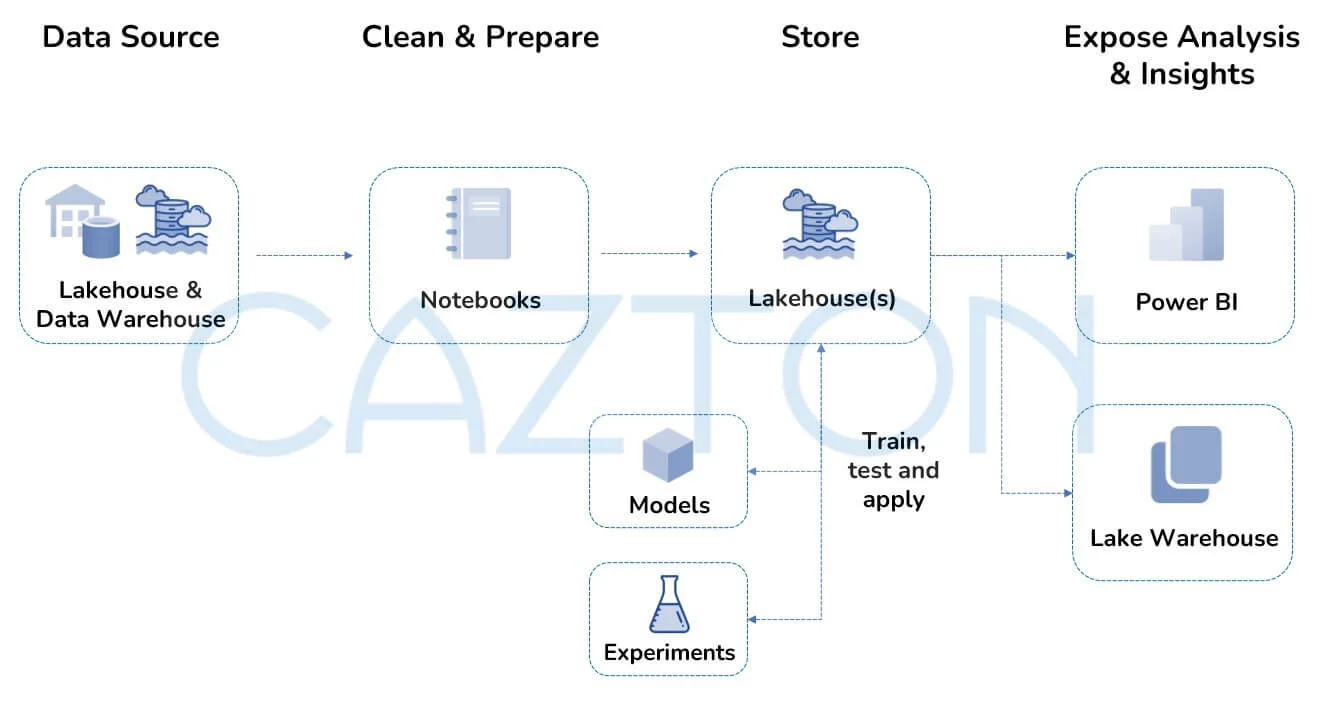
Explore a seamless data science workflow using Microsoft Fabric:
- Microsoft Fabrics offers a seamless ecosystem integrating tools and platforms for an efficient data science workflow, enabling organizations to uncover valuable insights. The journey starts with the lakehouse architecture and data warehouse for data ingestion, storage, and structured analytics.
- Data is then cleaned and prepared using Azure Databricks notebooks, promoting collaboration and efficient data manipulation. Clean data is stored in Azure Data Lake Storage for future use, maintaining data integrity and accessibility.
- Finally, Power BI and Azure Synapse Analytics provide visualization and real-time analytics capabilities. Microsoft Fabrics streamlines the data science workflow, empowering organizations to make data-driven decisions, resulting in operational efficiency, enhanced customer experiences, and sustainable growth.
Data Warehouse Workflow
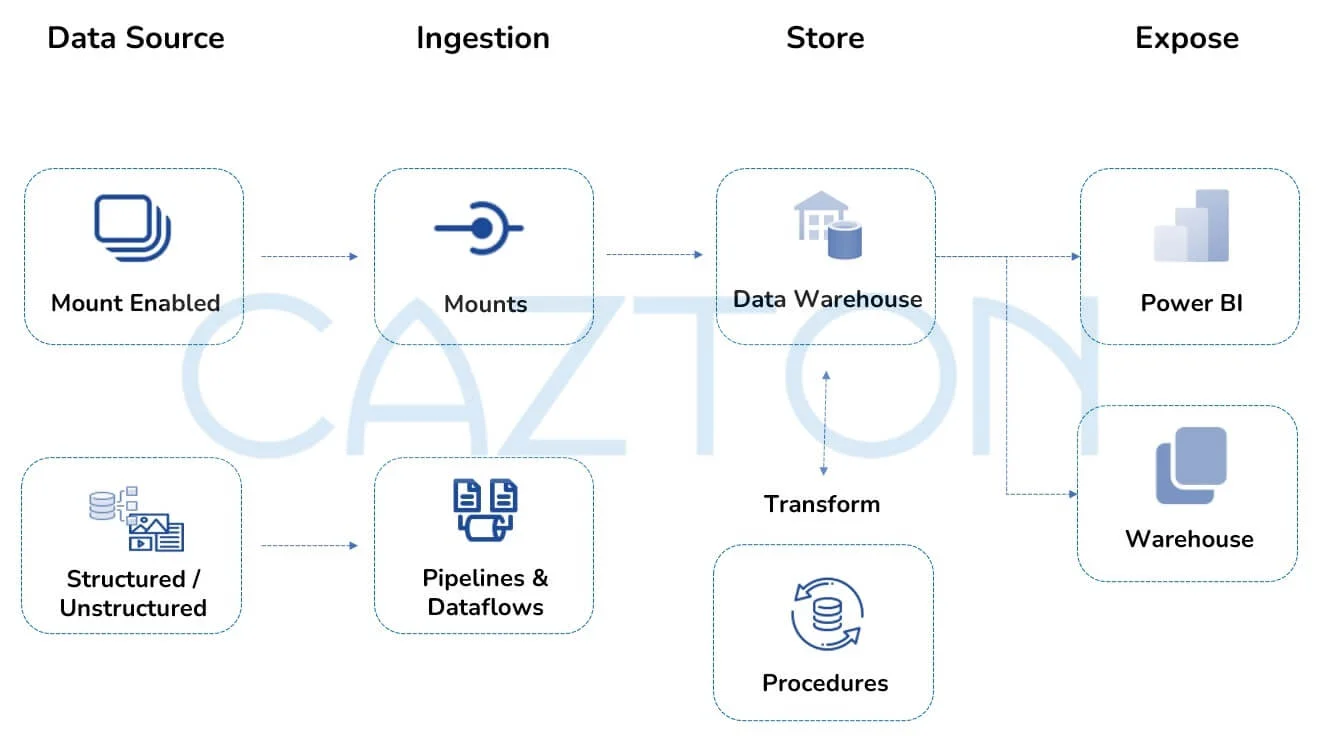
Explore a seamless data warehouse workflow using Microsoft Fabric:
- Microsoft Fabrics delivers a comprehensive ecosystem that seamlessly integrates tools and platforms for a streamlined data warehousing workflow. The journey begins with data ingestion from diverse sources, utilizing data pipelines and data flows to automate extraction, transformation, and loading (ETL) processes.
- Microsoft Fabrics enables efficient data storage using Azure Synapse Analytics, creating scalable data warehouses that optimize organization and availability for analysis and reporting. Power BI integration offers visually appealing, interactive dashboards and reports, uncovering trends and insights for informed decision-making.
- In summary, Microsoft Fabrics provides an efficient data warehousing ecosystem, from data ingestion and storage to analysis and insights with Power BI. Harnessing Microsoft Fabrics empowers organizations to drive innovation, enhance operational efficiency, and gain a competitive edge in a data-driven landscape.
Data Lakehouse Workflow
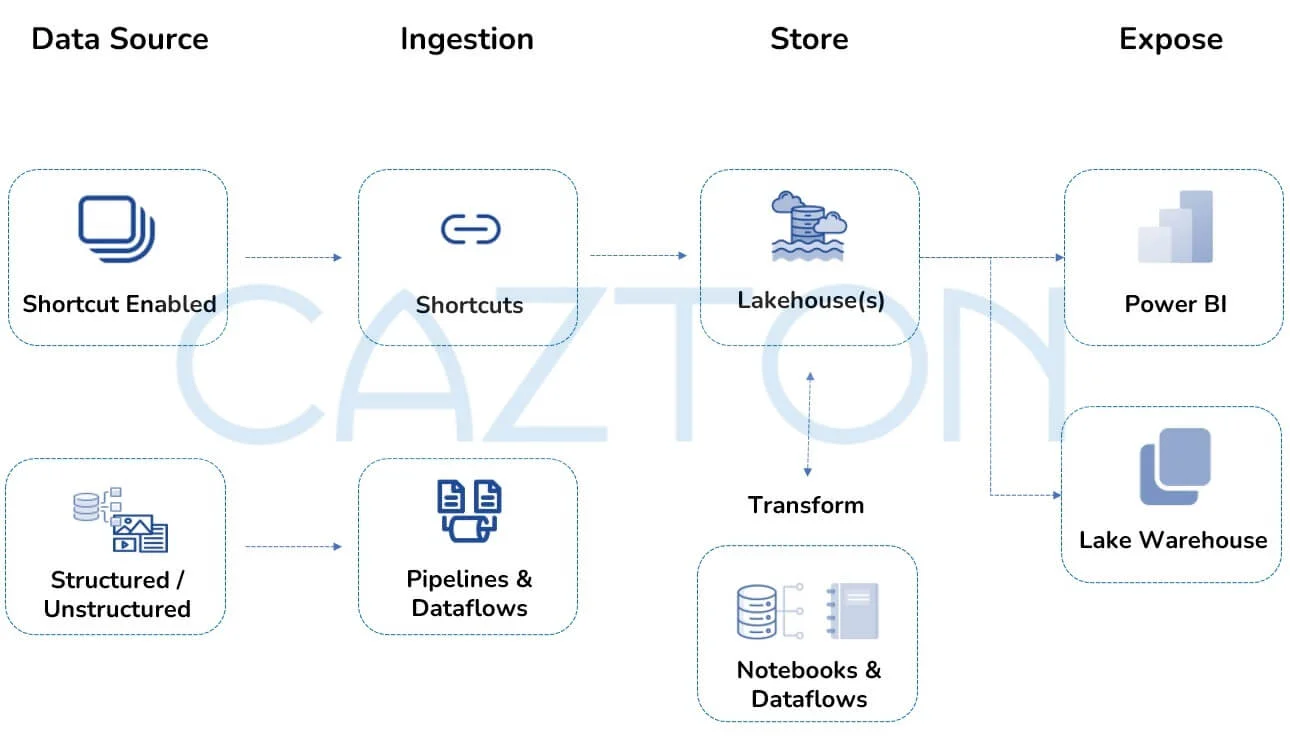
Microsoft Fabrics delivers a comprehensive ecosystem that seamlessly integrates tools and platforms, streamlining the workflow for data lakehouse scenarios. The journey begins with data ingestion from various sources using data pipelines and data flows, automating collection and standardization. Microsoft Fabrics then offers a robust lakehouse storage solution, combining the strengths of data lakes and data warehouses for a unified and scalable environment.
Azure Notebooks and data flows enable seamless data transformation and preparation for analysis, empowering data scientists to apply advanced algorithms and perform exploratory analysis. Microsoft Fabrics integrates with Power BI and the lake warehouse to extract meaningful insights and facilitate data-driven decision-making, enabling users to create visually compelling dashboards and reports. In conclusion, Microsoft Fabrics streamlines the end-to-end data lakehouse workflow, unlocking the true potential of data and enabling organizations to derive actionable insights, drive innovation, and stay ahead in today's data-driven landscape.
Real-Time Analytics Workflow
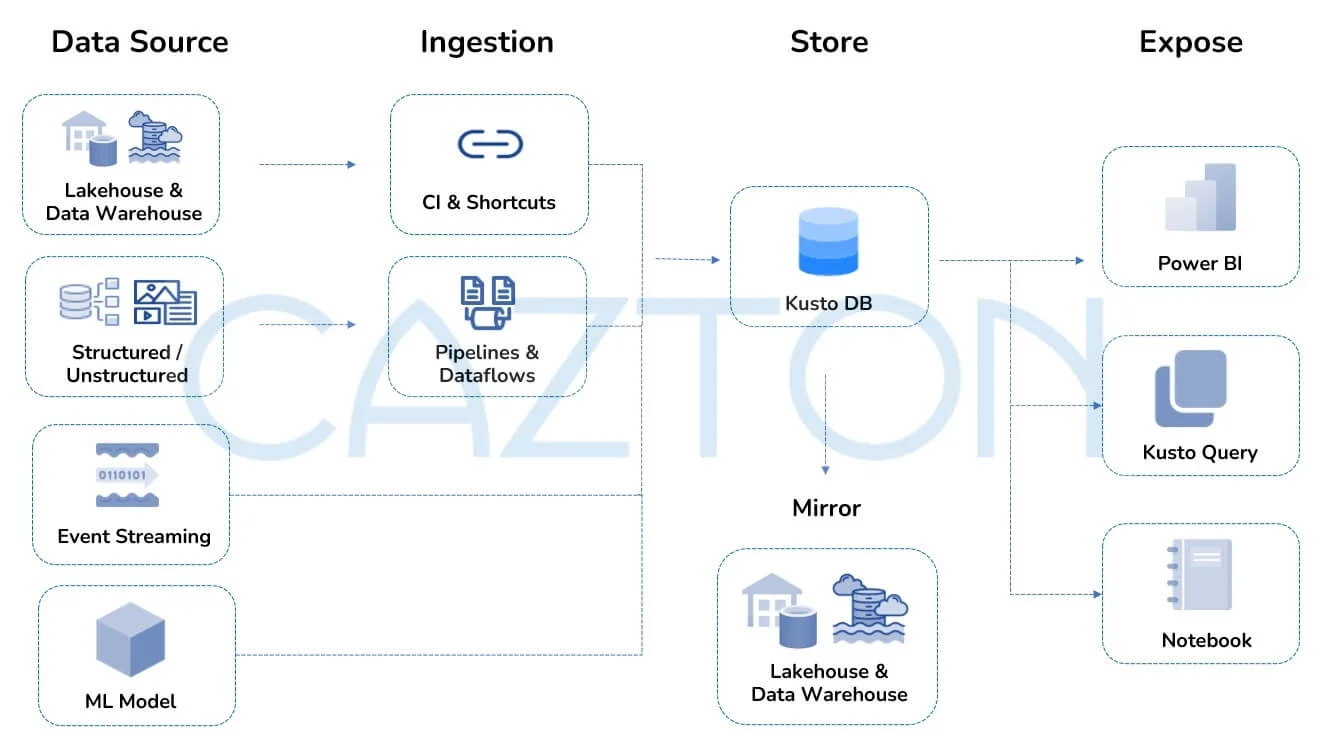
Microsoft Fabrics delivers a comprehensive ecosystem that seamlessly integrates various tools and platforms, enabling organizations to harness real-time data analytics. The journey begins with diverse data sources, including structured and unstructured data from lakehouses, data warehouses, event streaming, and machine learning models. Microsoft Fabrics ingests data using data pipelines and data flows, automating collection, transformation, and standardization for a unified real-time data stream.
The ingested data is stored in a robust Kusto DB solution, mirrored in lakehouses and data warehouses, ensuring availability and redundancy. Microsoft Fabrics integrates with Power BI, Kusto Query, and notebooks for valuable insights and real-time analytics. Power BI enables dynamic dashboards and reports, while Kusto Query language allows ad-hoc queries and complex analysis. Notebooks empower data scientists to apply advanced analytics and machine learning techniques, driving data-driven decision-making.
In conclusion, Microsoft Fabrics streamlines the end-to-end real-time analytics workflow, from data ingestion to storage and analysis using Power BI, Kusto Query, and notebooks. Harnessing Microsoft Fabrics unlocks the full potential of real-time data, enabling proactive decision-making, swift market trend responses, and staying ahead in today's dynamic business landscape.
Cazton is composed of technical professionals with expertise gained all over the world and in all fields of the tech industry and we put this expertise to work for you. We serve all industries, including banking, finance, legal services, life sciences & healthcare, technology, media, and the public sector. Check out some of our services:
- Artificial Intelligence
- Big Data
- Web Development
- Mobile Development
- Desktop Development
- API Development
- Database Development
- Cloud
- DevOps
- Enterprise Search
- Blockchain
- Enterprise Architecture
Cazton has expanded into a global company, servicing clients not only across the United States, but in Oslo, Norway; Stockholm, Sweden; London, England; Berlin, Germany; Frankfurt, Germany; Paris, France; Amsterdam, Netherlands; Brussels, Belgium; Rome, Italy; Sydney, Melbourne, Australia; Quebec City, Toronto Vancouver, Montreal, Ottawa, Calgary, Edmonton, Victoria, and Winnipeg as well. In the United States, we provide our consulting and training services across various cities like Austin, Dallas, Houston, New York, New Jersey, Irvine, Los Angeles, Denver, Boulder, Charlotte, Atlanta, Orlando, Miami, San Antonio, San Diego, San Francisco, San Jose, Stamford and others. Contact us today to learn more about what our experts can do for you.


